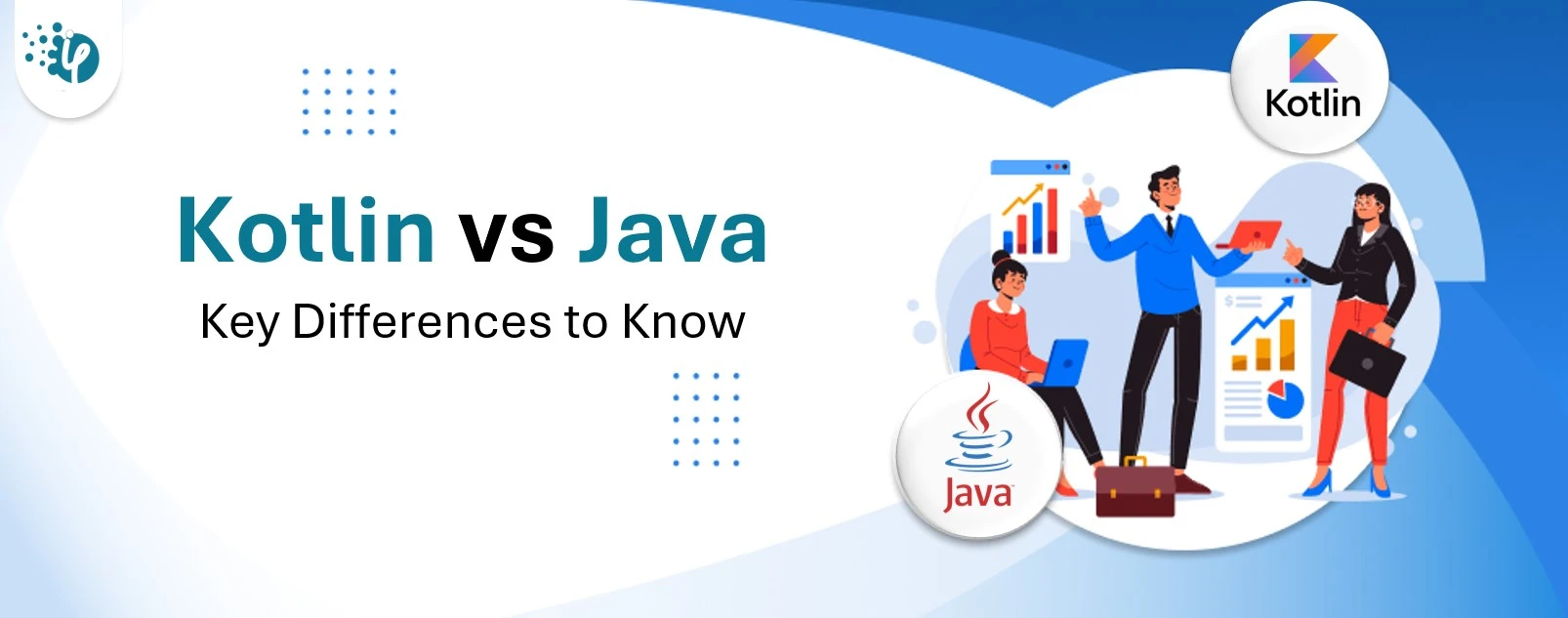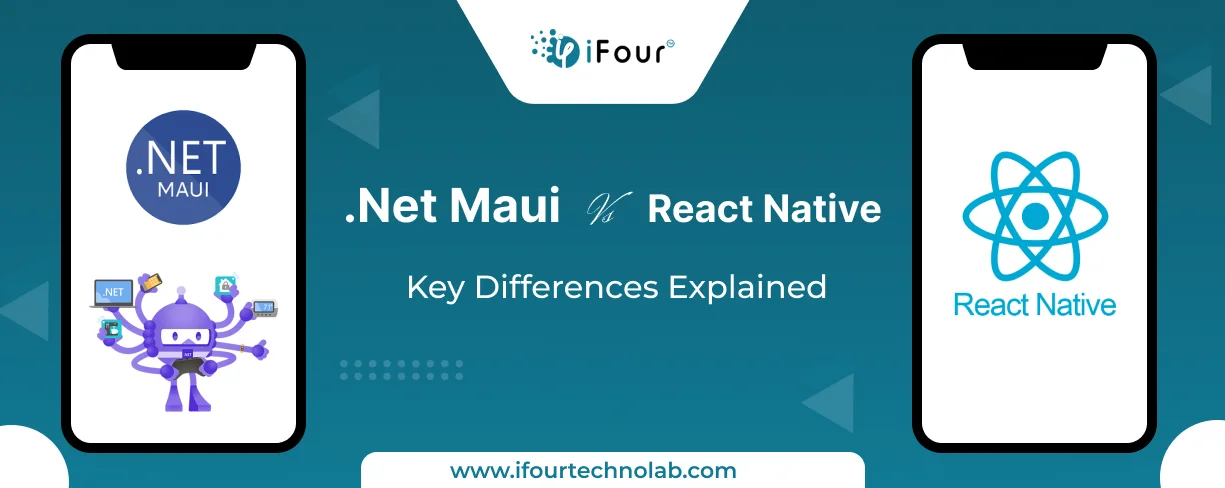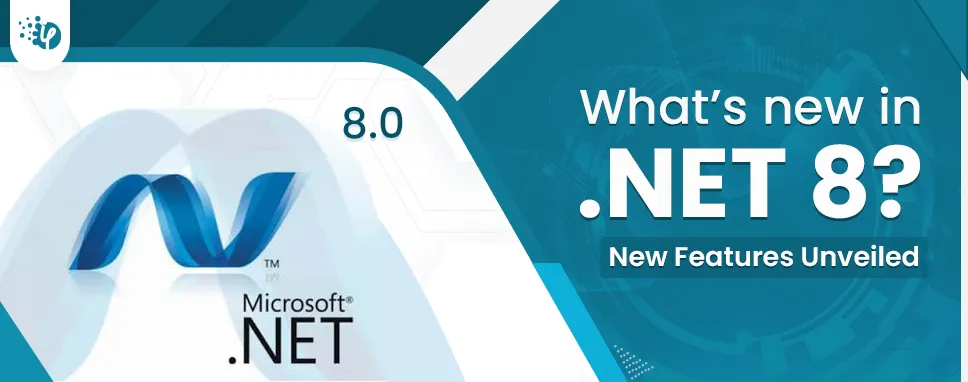Kotlin vs Java: 9 Key Differences for CTOs
Although Kotlin and Java have a lot of things in common, there are some critical differences too. Following are key differences between Kotlin and Java that CTOs should consider.
1. Kotlin vs Java: Feature Differences
| Kotlin |
Java |
| Kotlin supports functional programming concepts. |
Java is limited to object-oriented programming. |
| Kotlin is statically typed and can decide variable types based on the assignment value. |
Java remains a strictly typed language where variables are declared with a type when created. |
| Kotlin doesn't provide support for implicit conversions |
Java supports implicit conversions. |
| Kotlin allows adding extension functions to existing classes without inheritance. |
Java has very limited ability to add extension functions to existing classes. |
| Null-nullability is one of the greatest features of Kotlin that helps to reduce runtime exception. |
In Java, you can assign null values to variables which can cause null pointer exception at runtime. |
2. Understanding the Business Impact
To understand how given technology impacts your business (positively or negatively), three factors must be considered. i.e., Timelines and time to market, cost efficiency, long-term maintenance & operational costs. So let's look at Java vs. Kotlin from these perspectives.
1. Project Timelines and Time to Market
Let’s consider the speed of development in Java vs Kotlin:
Java: It is recognized for its robustness and extensive ecosystem; Java offers stability but can sometimes involve writing more code to accomplish tasks due to its verbose syntax.
Kotlin: Kotlin's clear structure and effectiveness can speed up development and enable faster product delivery. It often allows achieving the same results with less code as compared to Java.
Now let's get to know how each language impacts project delivery timelines.
Java: While Java provides a solid foundation for development, its verbosity can sometimes slow down the coding process, leading to longer development cycles.
Kotlin: By contrast, Kotlin's modern features contribute to faster development cycles. Its intuitive syntax and powerful abstractions enable developers to write cleaner and more maintainable code, resulting in expedited project delivery timelines.
Which one offers faster time to market?
From the above insights, we can say Kotlin is the clear winner.
2. Which is Cost efficient? Kotlin or Java
While choosing the software development approach, businesses must prioritize cost-effectiveness. The differences between Java and Kotlin should factor not just in terms of initial development cost but also the expenses associated with long-term operations and maintenance.
Kotlin vs Java: Development Costs
Java
Java's extensive ecosystem and widespread usage offer a plethora of resources, libraries, and frameworks. This abundance minimizes the initial setup costs required for a Java development environment. Additionally, Java developers are readily available in the job market, leading to lower recruitment costs.
Kotlin
Despite being newer than Java, Kotlin offers a modern syntax along with advanced features that improve developer productivity. However, there might be some initial costs associated with learning and setting up a Kotlin development environment. Additionally, finding Kotlin developers may be relatively more challenging than hiring Java developers.
Java vs Kotlin: Long-term Maintenance & Operational Costs
Java
Maintenance: Java’s verbosity and boilerplate-heavy nature can result in larger codebases, which increases the time and effort required for maintenance and bug fixing. However, Java’s mature ecosystem and active community can help alleviate these challenges.
Operational Cost: Java’s verbosity and boilerplate-heavy nature can result in larger codebases, which increases the time and effort required for maintenance and bug fixing. However, Java’s mature ecosystem and active community can help alleviate these challenges.
Kotlin
Maintenance: Kotlin remains easier to read and work with because of its clear structure and less boilerplate code, which leads to reduced costs in the long run for maintenance. This way developers have to spend less time understanding and fixing code.
Operational Cost: Kotlin applications, benefiting from their straight codebases and efficient performance, often require less infrastructure to run effectively. This efficiency can lead to significant cost savings in terms of operational expenses.
From this point of view, we can say Java can be cost-effective for small-scale projects, while Kotlin proves to be cost-saving for long-term maintenance.
3. Business Efficiency and Productivity in Java vs Kotlin
Java
Persistent Industry Presence: Java remains a well-established coding language with a long record of usage in the industry, offering a stable and reliable platform for business apps.
Extensive Libraries and Resources: Java offers a wide collection of libraries, frameworks, and tools that help coders build robust apps quickly.
Kotlin
Clear Syntax: Kotlin’s modern and streamlined syntax makes code easier for programmers to read, write, and understand. This clarity reduces errors and increases overall productivity.
Reduced Boilerplate Code: Kotlin reduces the amount of repetitive code that coders need to compose, allowing them to prioritize important parts leading to faster development.
Faster Development Times: Kotlin's concise syntax and powerful features allow developers to complete tasks more swiftly as compared to Java.
From this perspective, Java remains a productivity tool, however, Kotlin takes the lead in terms of increasing business efficiency and quick development cycle.
4. Cost Implications of Kotlin and Java
Java
Mature Ecosystem: Java benefits from a well-established ecosystem rich in resources, libraries, and frameworks. This ampleness of tools can cut development costs by minimizing the need for custom-built solutions.
Widespread Developer Availability: The popularity of Java ensures a vast pool of experienced developers available which results in reduced cost of hiring.
Lower Initial Costs: The well-established ecosystem and widespread usage of Java, help to set up the Java development environment with lower initial costs as compared to newer languages.
Kotlin
Improved Code Maintainability: The concise syntax and contemporary features of Kotlin help to craft more clean and easy-to-maintain codebases. With the improved code quality, there will be fewer bugs and errors, which help you save from long-term maintenance expenses.
Reduced Long-term Costs: By enabling quicker development cycles and reducing the occurrence of bugs, it can translate into substantial long-term cost reductions for projects. This results in reduced operation costs and boosts return on investment.
Overall, Kotlin takes the lead over Java when it comes to choosing cost-effective solutions.
5. Java vs Kotlin: Integration and Interoperability
Java
- Java supports various EAI tools and platforms such as Apache Camel, MuleSoft, and Spring Integration.
- Jakarta EE Extends Java SE with enterprise specifications, including JPA and RESTful Web Services, for seamless system integration. Java’s Robust integration through JDBC and ORMs like Hibernate, ensures smooth interaction with relational databases.
- Java supports microservices, which are often deployed in cloud environments, where Spring Boot and Quarkus-like frameworks contribute to building and deploying microservices easily.
Kotlin
- Kotlin is intended to seamlessly integrate with Java, so Kotlin code can invoke Java code and vice versa without any need for additional integration steps.
- Both Java and Kotlin compile into the same JVM bytecode, which allows for seamless integration of Kotlin into the existing Java environment.
- Kotlin is supported by major Java IDEs like IntelliJ IDEA, Eclipse, and Android Studio and works with Maven and Gradle build systems. Using these IDEs you can utilize features like code completion, refactoring, and debugging for Kotlin.
What’s best for integration? Java or Kotlin?
From the insights described above, we can say, Kotlin and Java platforms are competitive to each other.
6. Java vs Kotlin: Security & Risk Management
Java
With Java, you can utilize security features like the Java security manager, and Java authentication and authorization service (JAAS). It even supports multiple security frameworks and standards like OWASP recommendations for secure web apps.
Kotlin
Kotlin provides Null safety features to prevent NullPointerExceptions with requireNotNull function. Kotlin integrates with modern security frameworks, such as Spring Security, to provide robust authentication and authorization mechanisms.
Here’s how each language helps mitigate business risks:
Java
- Java is recognized for its stability and reliability. It offers robust security features such as the Security Manager, and Authentication and Authorization Service (JAAS).
- Java has a vast ecosystem with solutions for diverse business needs.
Kotlin
- Kotlin’s way of handling data types helps prevent runtime errors.
- Modern features like data classes, extension functions, and coroutines, enhance programmer productivity and provide more maintainable code.
- With Kotlin, you can leverage a rapidly growing ecosystem backed by JetBrains and Google.
Here’s how platform dependencies affect business strategy for each language:
Java
- Java’s platform independence allows flexibility in hardware and OS choices.
- Java’s cross-platform compatibility supports scalable solutions, enabling businesses to expand their offerings and adapt to varying customer needs and market conditions.
Kotlin
- Companies can switch to Kotlin, by integrating their existing Java codebases and leveraging their investments in Java libraries and infrastructure.
- As Kotlin works smoothly with Java, businesses can preserve their existing app while also making their codebase more upgraded using new technologies.
When it comes to assessing risk factors in Java vs Kotlin, Kotlin surely stands out with its modern security standards.
7. Performance and Reliability of Java and Kotlin
Java
Performance of Java in Large-scale Applications
Java's JIT compilation optimizes bytecode for native machine code, enhancing execution speed. Java provides robust concurrency utilities that ensure thread safety, preventing race conditions.
Java provides robust concurrency utilities and built-in mechanisms like synchronized blocks and concurrent data structures, preventing race conditions, and facilitating scalable application execution across multiple cores and processors.
Reliability in Large-Scale Applications
Java ensures robust error handling through its exception mechanism, which includes checked and unchecked exceptions.
Java provides robust concurrency utilities and built-in mechanisms like synchronized blocks and concurrent data structures, preventing race conditions, and facilitating scalable application execution across multiple cores and processors.
Kotlin
Performance Benefits of Kotlin
- Kotlin’s type system aims to eradicate null pointer exceptions (NPEs) during compile time.
- Kotlin's concise syntax and expressive components can result in generating easier-to-read and maintain code.
- Kotlin's coroutine support simplifies asynchronous programming, improving performance in concurrent tasks.
Reliability Enhancements in Kotlin
- Kotlin promotes type inference and immutable data structures which reduce side effects in multi-threaded environments.
- Kotlin introduces convenient features like Null safety features and standard library utilities to minimize runtime errors, prioritizing performance and reliability.
In short, Kotlin provides more benefits to improve performance and reliability.
8. Kotlin vs Java - Scalability
Scalability of Java for large-scale applications
Utilize Java's thread pools for effective multi-threaded application management. Implement database sharding to horizontally partition data across multiple databases and implement caching mechanisms for enhanced performance.
Cache frequently executed query results to minimize database access and improve response times.
Scalability of Kotlin for large-scale applications
Kotlin brings several modern language features and improvements that can simplify asynchronous programming, handling multiple tasks concurrently without traditional thread overhead. Kotlin is well-suited for developing microservices due to its concise syntax and support.
Java: Supporting Business Growth and Scalability
Java comprises an extensive collection of libraries and frameworks like Spring and Hibernate, offering solutions for a wide range of business requirements.
A large and active community ensures continuous improvement and quick issue resolution ensures support. Java’s spring boot framework is widely used for building microservices, and Java integrates well with cloud platforms (e.g., AWS, Azure, Google Cloud).
Kotlin: Supporting Business Growth and Scalability
Kotlin’s concise and expressive syntax reduces boilerplate code, development cycles, and maintenance.
Kotlin’s features horizontal scaling with microservices. Kotlin is well-suited for developing cloud-native applications. Kotlin applications can be containerized using Docker and orchestrated with Kubernetes, enabling automatic scaling and high availability.
When comparing scalability, Java and Kotlin both are good options in their own way.
9. Kotlin vs Java: Support and Community
Java
Performance Benefits of Kotlin
- Java benefits from extensive and well-maintained documents provided by Oracle and the Java Community Process (JCP).
- The OpenJDK project further fosters Java’s growth through a vibrant community of contributors.
- Apart from this, multiple online forums such as Stack Overflow provide a platform for Java coders to seek assistance, exchange knowledge, and engage in discussion.
Kotlin
Performance Benefits of Kotlin
- It has been recorded that Kotlin is constantly adopted across multiple domains, especially in Android development.
- You can obtain official documentation, tutorials, guides, and further support on Kotlin's website.
- The popularity of Kotlin has been boosted by Google’s recommendation of it as a primary language for Android development.
No doubt Kotlin is popular, but when it comes to assessing support Java takes the lead with its vast community support.
























